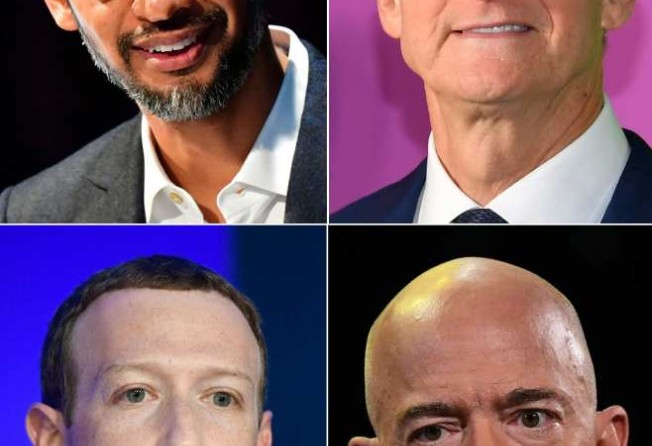
Investor reactions to China’s Big Tech crackdown smack of double standards
- Billions of dollars have been wiped off the equity market value of Chinese tech firms in recent weeks in reaction to Beijing’s regulatory changes
- Yet, markets have shrugged off US President Joe Biden’s executive order cracking down on anticompetitive practices in tech

China’s efforts to extend regulatory control over a number of business sectors may have hit a raw nerve with equity markets, prompting material markdowns in affected share prices, but investors should not overreact. Beijing’s approach might be robust but it isn’t that far removed from the way Western governments are addressing similar issues.
Large technology companies, Big Tech, are a case in point. Hundreds of billions of US dollars have been wiped off the equity market values of companies such as Alibaba, the e-commerce colossus and owner of the Post, and the internet giant Tencent Holdings as investors have taken fright at efforts by Beijing to establish greater regulatory oversight of such firms and moves to eliminate certain practices that the authorities now feel are restrictive.
In the past, for example, Beijing allowed China’s internet companies to develop business models incorporating “walled gardens”, where big firms built barriers around their platforms, but the Ministry of Industry and Information Technology now wants those walls dismantled.
Addressing the blocking of website links “is one of the priority issues of our campaign, and ensuring normal access to legitimate websites is a basic requirement for the development of the internet”, said Zhao Zhiguo, the ministry’s spokesman and director general of its Information and Communications Management Bureau, last week.
Having spent years developing business models that incorporated the walled garden approach, the firms – and investors who have bought into those business models – might not be too enthusiastic about making changes. However, there will surely be popular support from Chinese internet users for the ministry’s efforts.

The sensitivity of China Big Tech equity prices to Beijing’s regulatory roll-out partly reflects a narrative that portrays China’s moves as being part of a wider Chinese Communist Party agenda to assert greater control over critical sectors of the economy. Such control threatens business models which Beijing had previously seemed happy with, and which had consequently attracted substantive capital investment, often from overseas.
Perhaps there is an element of truth in such an argument but, if so, it would nevertheless be misleading to single out China and its Communist Party in this regard.
The United States is no shrinking violet when it comes to extending its own regulatory footprint, and Washington too has been making noises about the need to exercise greater control over how US Big Tech operates, yet equity markets have not reacted disproportionately.
Perhaps double standards are at work but no one should be in any doubt that Uncle Sam also has its beady eye on Big Tech.
The “Investigation of Competition in Digital Markets”, a report published by the US House Judiciary Committee’s subcommittee on antitrust, commercial and administrative law, in October 2020, is illuminating.
Focusing primarily on Amazon, Apple, Facebook and Google, the report argues that “to put it simply, companies that once were scrappy, underdog start-ups that challenged the status quo have become the kinds of monopolies [the United States] last saw in the era of oil barons and railroad tycoons”.
While the subcommittee report acknowledges that Amazon, Apple, Facebook and Google “have delivered clear benefits to society”, it also argues “that these firms wield their dominance in ways that erode entrepreneurship, degrade Americans’ privacy online, and undermine the vibrancy of the free and diverse press” and that “the result is less innovation, fewer choices for consumers, and a weakened democracy”.
Railroad monopolies came under fire in the 1870s, while, in 1911, the US Supreme Court ruled that John D. Rockefeller’s Standard Oil be broken up into multiple separate entities in accordance with the Sherman Antitrust Act of 1890.
Capitol Hill clearly has a long memory. Consequently, the subcommittee report put forward proposals to restore competition in the digital economy, strengthen US antitrust laws and revive antitrust enforcement.

Fast forward to July 9 this year, and US President Joe Biden signed an executive order cracking down on anticompetitive practices in Big Tech and other sectors, stating that “capitalism without competition isn’t capitalism, it is exploitation”.
Yet the market reaction to both the subcommittee report and the Biden announcement was one of equanimity, with US Big Tech stock prices holding up, a stark contrast to the sell-offs that have accompanied Beijing’s efforts to impose greater regulation on large tech companies in China.
Investors should be wary of double standards. Beijing and Washington may be taking different approaches but their common goal is to establish greater regulatory control over Big Tech. The sell-offs in China’s Big Tech seem somewhat overdone.
Neal Kimberley is a commentator on macroeconomics and financial markets